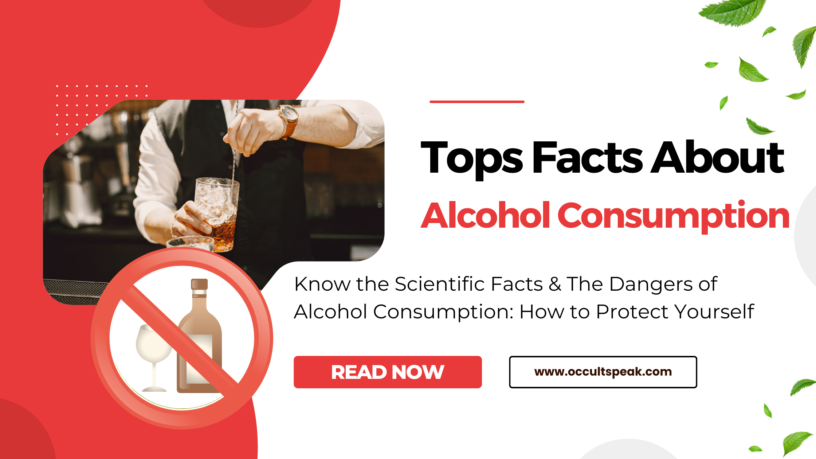Why is Adequate Liquor often called a spirit, but still most spiritual books say that people should not drink?
The word ‘spirit” comes from the Latin word for “breath” which was used for liquids that quickly vanished, or turned into gas, like alcohol. The second question uses irony in a rather forced way.
Today’s article will be pretty long because the 31st of December 2023 is coming to an end, and New Year 2024 is yet to begin.
Also most young people and teens would be drinking as a way to celebrate the new year.
But let me tell you that in Sanatan Dharma, there is no new year in December because that is Margashisha Mass. The real New Year is Chaitra Navratri, which usually falls in April.
What is the full name of Alcohol?
Another name for Alcohol is Ethanol is an organic substance with the formula CH 3CH 2OH.
It is also known as ethyl alcohol, grain alcohol, drinking alcohol, or just alcohol. There are different ways to write its formula, which is C2H5OH, C2H6O, or EtOH, where Et stands for ethyl.
How is Alcohol made?
The thing in these drinks that gets you drunk is alcohol. Ethyl alcohol is the name for the booze in drinks. It’s made when yeast turns the sugars in grains, fruits, and veggies into alcohol. The sugar in grapes is used to make wine, and the sugar in potatoes is used to make vodka in india.

What are the four kinds of alcohol?
There are four kinds of alcohol: isopropyl alcohol, methyl alcohol, ethanol that has not been distilled, and ethanol that has been distilled.
Isopropyl liquor. Isopropyl alcohol, also known as isopropanol, is made from propylene gas and is very good at killing germs. …
Methanol, ethanol that has not been distilled, and ethanol that has been distilled.
Let’s look at some spiritual texts that explain why people shouldn’t drink alcohol, whether it’s Breezer beer, fruit beers, wine, Breezer alcohol, vodka, alcohol markers, or any other type of alcohol. Alcohol is made from ethyl bromide.
What does the Bhagavad Gita say about Adequate Liquor Drinking?
The Bhagavad Gita, which is a very important Hindu text, doesn’t say anything about drinking alcohol or adequate liquor drinking. It does, however, stress self-discipline and how important it is to live a healthy and good life.
Do you know what the Bible says about Adequate Liquor Drinking?
1 Corinthians 10:21, says, “You cannot drink the cup of the Lord and the cup of demons too; you cannot have a part in both the Lord’s table and the table of demons.”

What the Vedas Say About Drinking Alcohol ( Adequate Liquor ) , Also Called SOMA Ras in the Text
People in India believe that the soma they use comes from the milkweed plant Asclepia acida or Sarcostemma Viminale. If you press out the juice of this plant, mix it with other things, and let it ferment, you get the potent sacrifice drink.
The Rig Veda talks about the process many times and gives very clear instructions on how to do it.
WHAT THE OTHER VEDAS SAY
In the early days of our history, the Aryans enjoyed drinking adequate liquors with spirits, maybe too much.
But bad things happened that made people realise they needed to stop this growing habit. It also made people feel disgusted, so later Vedas forbade using spirits to please the senses, saying that “wine is unfit to be drunk, unfit to be given, unfit to be accepted.”
This is the first time in history that the right to drink alcoholic spirits was questioned and refused. It was a step in the right direction.
WHAT Does MANU Say about (Adequate Liquor ) Alcohol Consumption
In the later Vedic times, there was a compromise that allowed the use of alcohol at religious and sacrificial events but not in everyday life.
Around 500 BC, during the time of Manu, a wise man knew that to fight evil, it had to be completely wiped out, not just contained. He set about eliminating evil.

Having Adequate Liquor drinking and having fun
Yes, this Alcohol /Liquor drinking can make you feel good for a short time, but using it too much over a long period can hurt you.
Many mental health problems are linked to drinking adequate liquor problems and vice versa. People who drink a lot are the ones most harmed.
Your brain is the body part that is most affected by drinking a lot. That special drink makes you feel calm while you drink it, but it is also messing with your brain in many ways.
Let’s look at how alcohol can hurt your brain, some myths about alcohol, and how alcohol can affect you in general.

Drinking red wine (adequate liquor) and having more sex drive
Compounds in red wine, such as resveratrol and quercetin, have been shown to improve blood flow and circulation.
This makes it one of the best drinks for having better sex. It means that more blood can get to all the important parts of your body during sex, making you feel and enjoy more.
Do you know that adequate liquor drinking changes the way your brain works?
The brain works because of how different chemicals interact with each other. When you drink alcohol, these chemicals are often thrown off.
Alcohol is a depressant that throws off the balance of chemicals in the brain.
This can change your thoughts and feelings, which will show up in the way you act.
Most of the time, the changes are for the worse, which means they can be worse for your health and cause long-term problems. Psychoactive chemicals help send messages from one nerve cell to another.
You may feel calm when you drink, but that’s not because of the alcohol. It’s because chemicals in your brain are out of balance.
Because of this, drinking alcohol can affect different people in different ways. Being able to take down one peg can make some people feel down, some people feel nervous, and some people feel more confident.
What does worry have to do with (adequate liquor ) Alcohol drinking?
While the anxiety that comes from drinking adequate liquor i.e alcohol only lasts a short time, the damage it does lasts a long time. Changes in chemicals in the brain are also to blame for this.
On the other hand, when the effects of drinking wear off, it can be very hard for the person. Studies have shown that the use of alcohol to relax can lead to the growth of anxiety.
As a result, once you start using alcohol to deal with worry, it’s usually too late to go back. Most people get used to alcohol more quickly as they drink more of it.
After some time, it will lead to more dependence, which will lead to bad clinical effects.
This is more likely to happen if you have a hangover: you will probably feel more anxious. When this happens, drinking more alcohol can make the effects worse.

What does adequate liquor drinking have to do with being depressed?
A lot of the time, people who drink a lot do so to deal with their sadness. But it can be hard to tell the difference between the cause and the impact.
Even if someone is sad, that doesn’t mean they will only drink. Another thing that matters is how each person deals with things and what they do to feel better. It can also mean that the symptoms have changed.
Any overriding signs can make a person’s mood and thinking worse, which is why they might drink to relax.
Several studies have also shown that some antidepressants can cause people to start drinking too much again. As a result, drinking can be directly linked to sadness.
If someone drinks Extreme OR Adequate Liquor and Suicide, is there a link between the two?
Researchers have found a link between drinking alcohol and acting in a rash or reckless way. Patients who usually drink a lot make decisions that don’t make sense.
This means there is a bigger chance that the person will hurt themselves or the people around them. It has been shown over and over again that heavy drinking can also lead to suicidal thoughts.
As a result, it is safe to say that the vulnerable patient group is much more likely to drink alcohol and attempt suicide.
Extreme drinking can also lead to insanity, which can make it impossible to think clearly. This insanity can happen when someone is drunk or when they are trying to stop drinking.
As a result, you need to stop drinking alcohol. If not stopping, at least cutting back on the amount you take in to lessen the harm that might happen.
Researchers have looked into how much alcohol beer drinkers drink.
We need to think about how I would define “brain damage” before we can answer this question.
We could check the kidneys’ filtration rate and look at the contents of the pee to see if they were damaged.
In the same way, we could check for liver damage by measuring certain liver enzymes in the blood or by looking at the proteins that the liver makes, which show that it is doing its job of making things.
Because the brain is so different in how it looks and how it works, such an easy way to test it doesn’t work well.
Because of this, we have to use less-than-ideal methods of “brain damage” to try to answer this question. Please keep in mind that problem drinkers and alcohol abusers are not included in the study below. This is for people who drink occasionally.
Brain size and shrinkage with Adequate Liquor and Non-Alcoholic Wine
The first measure that is probably the easiest to agree on is the size of the brain itself. Often, we can see atrophy (shrinkage) in different parts of the brain on CT or MR scans.
This kind of decline may happen naturally as people age, but it can also be linked to a lot of different diseases that can lead to dementia, so it could be used as a measure for our purposes.
The interesting study by Kubota et al. came out in 2001 in the Journal of Neurology, Neurosurgery, and Psychiatry.
In their study, they used MRI to look at the frontal brain volume of 1432 “non-alcoholic” people who drank different amounts of alcohol.
The following graph shows how the subjects were put into groups by decade (to account for atrophy that comes with getting older) and then compared within their age group.
It was found that light and average drinkers did not have a statistically significant difference in frontal lobe volume compared to people who did not drink.
Heavy drinkers (>350g of ethanol/week) in their 30s and 50s had twice the chance of frontal lobe atrophy compared to people who didn’t drink.

How the brain works with Adequate Liquor or Alcohol Drinking
The link between drinking and thinking skills is not as simple as it seems. There is evidence from several studies that drinking in moderation is linked to better brain function.
But this “U-shaped” link between drinking and thinking skills is mostly based on observational data that is full of other factors that could change the results, so it needs to be understood with care.
Not long ago, a review in the journal Substance Abuse found that of the studies that looked at cognitive impairment and alcohol use, 31% showed evidence of harm, 66% showed no link, and only 3% showed evidence of benefit.
To show how confounding factors can change this link, Corley et al. studied a group of 922 healthy adults whose IQs had been recorded since they were 11 years old.
Before adjusting for other factors, moderate to heavy drinking (>2 units/day) was linked to better success on cognitive tests than light drinking or no drinking at all.
“Most of these associations were removed or substantially attenuated” after childhood IQ and adult social level were taken into account.
There was still a small link between drinking alcohol and memory and verbal thinking, but it’s probably not very important from a clinical point of view.
There are many ways that “alcohol abuse” hurts the brain, but it’s not as clear what happens when you drink small amounts of alcohol occasionally.
Cerebral perfusion, glucose usage, and histologic changes are few other ways to measure “brain damage”. I’ll edit this answer whenever I find some more new studies.
References
1. Kubota M, Nakazaki S, Hirai S, et al. Alcohol consumption and frontal lobe shrinkage: the study of 1432 non-alcoholic subjects. J. Neurol. Neurosurg. Psychiatr. 2001;71(1):104-106. http://jnnp.bmj.com/content/71/1/104.full
2. Britton A, Singh-Manoux A, Marmot M. Alcohol Consumption and Cognitive Function in the Whitehall II Study. American Journal of Epidemiology. 2004;160(3):240 -247. http://aje.oxfordjournals.org/content/160/3/240.abstract?ijkey=3d98905faeb432cee392189a852ef16010e78177&keytype2=tf_ipsecsha
3. Lang I, Wallace RB, Huppert FA, Melzer D. Moderate alcohol consumption in older adults is associated with better cognition and well-being than abstinence. Age Ageing. 2007;36(3):256-261. http://ageing.oxfordjournals.org/content/36/3/256.long#ref-6
4. Reid MC, Boutros NN, O’Connor PG, Cadariu A, Concato J. The health-related effects of alcohol use in older persons: a systematic review. Subst Abus. 2002;23(3):149-164. http://www.ncbi.nlm.nih.gov/pubmed/12444348
5. Corley J, Jia X, Brett CE, et al. Alcohol intake and cognitive abilities in old age: the Lothian Birth Cohort 1936 study. Neuropsychology. 2011;25(2):166-175. http://www.ncbi.nlm.nih.gov/pubmed/21381824
Disclaimer:
This answer is not a substitute for professional medical advice. This answer is only for general informational purposes and is not a substitute for professional medical advice. If you think you may have a medical emergency, call your doctor immediately.
Always seek the advice of your doctor before starting or changing treatment. Essentially, “Occultspeaks” responds to health-related questions intended to spread the facts on a given topic.
Love & Light,




Leave a Reply